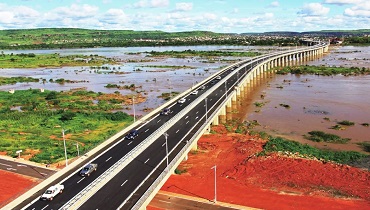The Australian Alert Service is the weekly publication of the Australian Citizens Party.
It will keep you updated on strategic events both in Australia, and worldwide, as well as the organising activities of the Citizens Party.
To subscribe to the Australian Alert Service, it's easy, and it's secure.
Lead Editorial
21 August 2024
Vol. 26 No. 34
This week’s AAS includes a very important report, “West African nations make a break for sovereignty” (p. 9), which covers the progress in Africa from embracing development economics that is the only true pathway to national sovereignty and prosperity. It includes figures published in a new book on China-Africa relations showing that in Africa, China has constructed and upgraded more than 10,000 kilometres of railways, nearly 100,000 km of highways, over 60,000 km of submarine cables, nearly 1,000 bridges, 100 ports, and more than 100 health facilities and schools. By any measure this is tremendous progress under the Belt and Road Initiative that 52 of 54 African countries have joined, and positively impacts more than 900 million African people.
But in Australia, we are expected to fear this news, as evidence of the supposed threat of China’s growing influence around the world (even though, ironically, China is our biggest and best trading partner). We as a nation have instead embraced war economics—an orientation to resource development and manufacturing for military supply chains controlled ultimately by the United States. The government is passing law after law to lock Australia into the $368 billion AUKUS nuclear submarine deal, and the follow-on AUKUS Pillar II for developing advanced capabilities jointly with the USA and UK in undersea technology, quantum technology, AI and autonomy, cyber capabilities, hypersonic and counter-hypersonic capabilities, innovation, and information sharing. Its promoters make it sound wonderful, especially the rhetoric of reviving manufacturing and economic development in Australia, except it is all in the service of preparing for war.
The same laws are cutting off Australia’s economic cooperation with any country the USA disapproves of, starting with China. That’s the reason why this week the Canberra campus of the University of New South Wales (UNSW), which functions as the Australian Defence Force Academy, announced it is discontinuing research projects with institutes in China. Australia is one of the top research countries in the world, not because of local investment, but because Australian universities leverage cooperation with other countries that fund research, led by China, into results for Australia. That cooperation has been peaceful, but now we’re destroying it to align with an all-out war mobilisation. And it’s not just a few research projects that are being harmed: naturalised Australian former “top gun” pilot Dan Duggan and his family are caught in the middle of the same dynamic, facing being ripped apart by his extradition to the USA at the behest of political forces intent on making an example of him for their agenda of destroying all economic cooperation with China.
Contrast this new national orientation to the outlook of Australian political leaders of yesteryear, such as Malcolm Fraser and Paul Keating, who actively sought to assert an independent Australian position on foreign policy issues against British and American wishes (p. 5). That generation of political leaders and government officials is increasingly speaking out against Australia locking itself into this drive to war. Former deputy ambassador to China John Lander has forcefully expressed that view in the AAS and in interviews with the Australian Citizens Party’s Citizen Insight program over the past few years. Now another former Ambassador to China, Ross Garnaut, is also speaking out. As reported in Crikey.com.au on 20 August, Garnaut called for Australia and the USA to accept the reality of a multi-polar world, instead of fighting to cling to the neoconservative fantasy of being the sole global superpower: “There is no future for our two peoples [Australia and US] and there may be no future for humanity unless our US ally can get used to being one of several powerful states in a world that allows primacy to none of them”, he warned.
Australia won’t escape this strategic trap unless we recognise it is in our national interest to embrace the economics of development, instead of war, as other nations are.
In this week's issue:
- Boohoo anti-cash Matt Comyn—Australia’s biggest sook
- Tell the Attorney-General: Free Dan Duggan!
- When Australian politicians aspired to independence
- AUKUS and AUSMIN ‘updates’ accelerate countdown to war
- The public’s Kiwibank on the auction block
- West African nations make a break for sovereignty
- Australia and New Zealand must stop US warmongering
- ‘We need to reclaim our republic and end our damn empire’: Colonel Wilkerson
- ‘Reawakening the spirit of turning swords into plowshares’: Dennis Kucinich
- ASIC is under siege!
- Who stole the remote control? The transformation of the US dollar
- ALMANAC - 1945 contest: Should government or private sector oversee banking?
Click here to find out how to subscribe. For freely available AAS articles, click here.
Click here for the archive of previous issues of the Australian Alert Service








